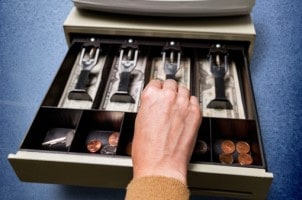I am constantly on the lookout for research studies conducted on the subject of theft by employees.
A few years ago, I came across a study conducted by Kessler International, a forensic accounting and investigative firm. In a press release from 2013, I found that Kessler had conducted an anonymous survey of 500 employees sampled from a variety of retail and service companies. The headline reported that an astonishingly high 95 percent of employees reported stealing from employers, which was up significantly from a previous study they conducted in 1999 that found that only 79 percent of employees reported stealing.
Since these percentages were both higher than any that I have previously seen, I was very interested in the study’s findings. A quick review explained why the percentages were so high. In short, the researchers included theft of time and theft of office supplies in their dependent variable. While one could argue that these forms of theft are not “serious,” in fact, they add up to significant losses in the workplace.
Theft of Time and Supplies
Thirty years ago in our book, Theft by Employees, John Clark and I also discovered extremely high levels of “time theft” and significant pilferage of office supply items. Apparently, this is still a large problem, especially among younger employees who feel that they are justified in these thefts, rationalizing that more is owed them by their employers for their work.
In the Kessler survey, more than 30 percent of respondents admitted to falsifying the actual time that they worked. This behavior seems to be exacerbated by heavy smartphone use, such as texting friends while at work, and by the use of workplace computers to check social media.
While social media was virtually nonexistent when Kessler first conducted this survey in 1999, now it is ubiquitous, and the many minutes spent checking and updating personal accounts now add up to hours of unproductive time at work—unwittingly paid for by employers. Remarkably, 63 percent of those surveyed admitted to checking their social media pages regularly during the work day.
Theft of office supplies for personal use is also just as high as it was more than 30 years ago when John Clark and I conducted our landmark survey. Pens, paper, notepads, and even toilet paper are regularly taken from the workplace to use at home by employees, spouses, family members, and children.
Theft of Corporate Intelligence
Other forms of larceny that were admitted by employees responding to the Kessler International survey included theft of corporate intelligence. While stealing corporate secrets and intelligence was reported at much lower levels, it can be argued that these forms of employee dishonesty, such as unauthorized taking lists of clients, marketing information, and proprietary information, can be even more harmful to the company than the other forms of theft reported above. Thirty-five percent of employees responding to the survey admitted to having stolen goods or services from their employer at some time in the past. Moreover, 45 percent reported that they were aware of or had witnessed other employees at current or former places of work stealing goods and services from their employers.
Perceived Inequitable Treatment
Employee theft is prevalent in many different workplaces, not just in the retail industry. Unfortunately, the negative impact of theft by dishonest employees is still significant and not yet close to being under control. Explaining why employees “bite the hand that feeds them” involves a conversation that covers many different causes. However, this study, in addition to many other examples of past research (some that I have personally conducted), convince me that the heart of the solution involves reassuring employees that they will be equitably rewarded and fairly compensated for the contributions that they make at work.
Otherwise, it would appear that employees who perceive inequitable treatment by their employers will take matters into their own hands by means of theft, dishonesty, and counterproductivity. In other words, pay your employees well, or they will find a way to pay themselves at a much greater cost to the profitability and success of the company. Perhaps this fact should be considered as our nation continues to consider the costs and benefits of raising the minimum wage.
This article was originally published in 2014 and was updated April 4, 2018.


